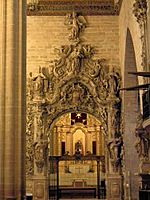Florentino Asensio Barroso facts for kids
Quick facts for kids Blessed Bishop Florentino Asensio Barroso |
|
|---|---|
| Titular Bishop of Euroea in Epiro | |
| Church | Roman Catholic Church |
| Appointed | 11 November 1935 |
| Enthroned | 8 March 1936 (by proxy) |
| Reign ended | 9 August 1936 |
| Predecessor | Pedro Dionisio Tibiletti |
| Successor | Alfredo del Tomba |
| Other posts |
|
| Orders | |
| Ordination | 1 June 1901 |
| Consecration | 26 January 1936 by Remigio Gandásegui y Gorrochátegui |
| Rank | Bishop |
| Personal details | |
| Birth name | Florentino Asensio Barroso |
| Born | 16 October 1877 Villasexmir, Valladolid, Kingdom of Spain |
| Died | 9 August 1936 (aged 58) Barbastro, Huesca, Second Spanish Republic |
| Alma mater | Pontifical University of Valladolid |
| Motto | Ut omnes unum sint ("That all may be one") |
| Sainthood | |
| Feast day | 9 August |
| Venerated in | Roman Catholic Church |
| Title as Saint | Blessed |
| Beatified | 4 May 1997 Saint Peter's Square, Vatican City by Pope John Paul II |
| Attributes |
|
| Patronage |
|
Florentino Asensio Barroso (born October 16, 1877 – died August 9, 1936) was a Spanish Roman Catholic bishop. He was known for his strong faith and dedication to helping others. He served as a special leader, called an Apostolic Administrator, for the Diocese of Barbastro in Spain.
Before becoming a bishop, he was a priest who helped many people. He worked as a chaplain for groups like the Little Sisters of the Poor. In 1935, he became a bishop. Sadly, he was killed in 1936 during the Spanish Civil War.
His role as administrator was not easy, and he faced opposition. He was captured and later shot to death. In 1997, he was declared "Blessed" by the Church. This happened because it was believed he died for his faith.
Contents
Early Life and Education
Florentino Asensio Barroso was born on October 16, 1877, in Valladolid, Spain. His parents were not wealthy. He received his First Communion on May 1, 1887.
He first thought about joining the Order of Saint Augustine, a religious group. He even made his first promises in 1888. However, he was later encouraged to study at a local seminary instead. A seminary is a school where people train to become priests.
Becoming a Priest
Florentino began his studies to become a priest. He received several minor religious ranks in 1889. He became a sub-deacon on September 22, 1900, and a deacon on December 22, 1900.
He was finally ordained as a priest on June 1, 1901. This ceremony was performed by the Auxiliary Bishop of Valladolid. He also earned a special degree, a doctorate in theology, from the Pontifical University of Valladolid. For a short time, he taught at this university.
Service and Leadership
After his studies, Florentino served as a pastor in Villaverde de Medina until 1902. He then moved to Valladolid. There, he became a personal assistant to Archbishop Macho, who later became a cardinal.
From 1902 to 1917, he worked as a confessor at the seminary in Valladolid. A confessor is a priest who listens to people's confessions. He also served as a confessor for various religious groups and monasteries from 1920 to 1935. In 1925, he was given the important job of teaching catechism to adults. Catechism is a way of teaching the basics of the Christian faith.
Florentino was well-respected for his strong dedication to helping the sick and the poor. In 1935, a church official named Federico Tedeschini told Pope Pius XI that Florentino would be a good choice to become a bishop. He was also chosen to be the Apostolic Administrator of Barbastro. He became a bishop in 1936. He officially took on his new role in Barbastro on March 8, 1936.
Arrest and Death
On July 22, 1936, Florentino Asensio Barroso was arrested at his home. This happened during the start of the Spanish Civil War. He was put in prison.
On August 9, he was shot to death. His body, along with others who were killed, was taken to a cemetery in a truck. They were placed in a mass grave around 2:00 AM. After the war ended, his remains were identified. This was possible because of initials on his clothes.
Beatification Process
The process to declare Florentino Asensio Barroso "Blessed" began under Pope Pius XII. This started in Barbastro on May 20, 1947. He was given the title Servant of God at this time.
During this process, people who knew him gave their testimonies. Documents were also collected to show that he was killed because of his faith. This local investigation finished on April 30, 1952. The information was officially approved on October 4, 1991, allowing the case to move forward.
A special report, called a Positio, was sent to the Congregation for the Causes of Saints in Rome in 1993. His martyrdom, meaning he died for his faith, was approved on January 31, 1997. This approval allowed Pope John Paul II to declare him "Blessed" on May 4, 1997.
See also
 In Spanish: Florentino Asensio Barroso para niños
In Spanish: Florentino Asensio Barroso para niños


